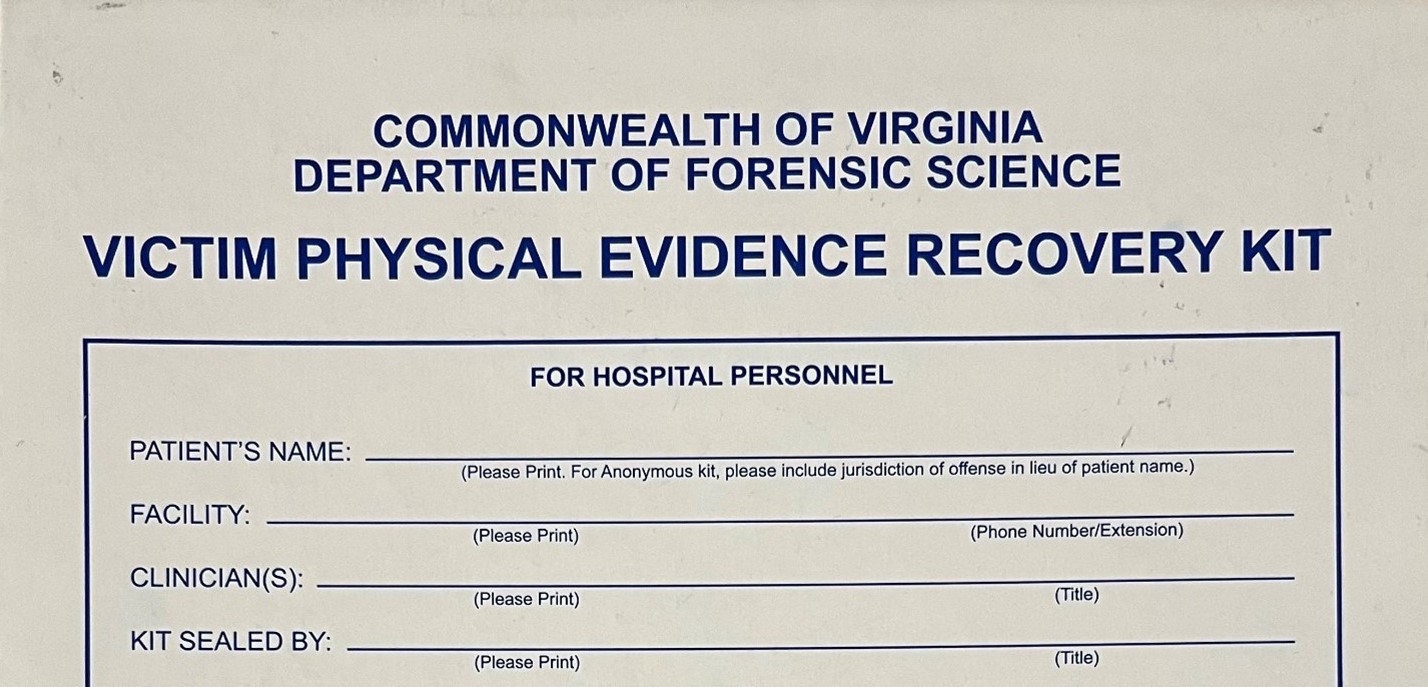Physical Evidence Recovery Kit (PERK) Legislation

On July 1, 2016, comprehensive legislation was implemented to ensure timely processing of Physical Evidence Recovery Kits (PERKs) and streamline the forensic analysis process. Additionally, the legislation addressed the retention of PERKs and introduced provisions to protect victims' rights concerning information about the PERK collected in their cases. To further enhance the tracking and management of PERKs, mandatory use of the PERK Tracking System was later implemented, effective July 1, 2020. This system was designed to provide a centralized and standardized approach to monitor the status and progress of PERKs, promoting efficiency and accountability within the forensic analysis and investigation process.
- Anonymous PERKs (Code of Virginia § 19.2-11.6)
- Law enforcement taking possession of PERKs (Code of Virginia § 19.2-11.7)
- Submission of PERKs to the Department (Code of Virginia § 19.2-11.8)
- Lack of Compliance with procedures (Code of Virginia § 19.2-11.9)
- Expungement of DNA profile (Code of Virginia § 19.2-11.10)
- Victim's right to notification of scientific analysis information (Code of Virginia § 19.2-11.11)
- Cost of PERKs (Code of Virginia § 19.2-11.12)
- PERK Tracking System (Code of Virginia § 19.2-11.13)
PERK Submission FAQ for Law Enforcement
Is the PERK required to be submitted for testing if the suspect is known?
- Yes. Whether or not the suspect is known, the PERK must be submitted for analysis. A known suspect is not a statutory exemption in Va. Code § 19.2-11.8 for PERK submission, and further questions should be directed to the Commonwealth Attorney, or the legal advisor to the law enforcement agency investigating the case.
Is the PERK required to be submitted for testing if the victim is no longer participating with the investigation?
- Yes. Regardless of victim participation, the PERK must be submitted for analysis. Victim disengagement is not a statutory exemption in Va. Code § 19.2-11.8 for PERK submission, and further questions should be directed to the Commonwealth Attorney, or the legal advisor to the law enforcement agency investigating the case.
Is the PERK required to be submitted for testing if there is a decision not to prosecute?
- Yes. Regardless of prosecution status, the PERK must be submitted for analysis. A decision not to prosecute is not a statutory exemption in Va. Code § 19.2-11.8 for PERK submission, and further questions should be directed to the Commonwealth Attorney, or the legal advisor to the law enforcement agency investigating the case.
May a police department or sheriff’s office enter into a memorandum of understanding (MOU) with a regional jail to take possession of PERKs from the healthcare provider?
- No. Healthcare providers are required to notify the law enforcement agency with the “primary responsibility” for investigating a report of criminal sexual assault, which must then “forthwith take possession” of the PERK. Va. Code § 19.2-11.7. Regional jails likely will conduct an administrative investigation pursuant to the Prison Rape Elimination Act (PREA) when the victim is an inmate of their facility, but they do not have the same power as a sheriff or a law enforcement officer in the investigation of allegations of criminal behavior. This is different from a criminal investigation. Therefore, regional jails do not have the “primary responsibility” for the criminal investigation of a sexual assault. Further questions should be directed to the Commonwealth Attorney, or the legal advisors to the relevant agencies.
What should a regional jail do with any PERKs it has stored based on prior receipt from a healthcare provider?
- A regional jail should transfer the PERK as soon as is reasonably practicable to the law enforcement agency with the primary responsibility for investigating reports of criminal behavior for the locality where the sexual assault offense occurred. The receiving law enforcement agency will need to update the PERK Tracking System and determine whether submission to the Department of Forensic Science is required pursuant to Va. Code § 19.2-11.8 based on its investigation. In such a situation, it is recommended that you consult with the SAKI Investigator at the Office of the Attorney General at saki@oag.state.va.us.
PERK FAQs for Healthcare Providers
What “law enforcement agency” must a healthcare provider notify to take possession of a collected PERK when a victim wishes to report the offense?
- In most cases, the police department or sheriff’s office, with general law enforcement responsibility for the locality where the offense occurred, will be the agency to be notified and take possession of the PERK. Va. Code § 32.1-162.15:9 requires the healthcare provider to notify the law enforcement agency, with the primary responsibility for investigating a sexual assault, within four hours of the medical forensic examination and arrange for collection of the PERK within a reasonable timeframe. See also Va. Code § 19.2-11.7 (requiring the law enforcement agency to forthwith take possession). In some situations, the Virginia State Police or a campus police department may have the primary responsibility, by agreement or otherwise, to investigate the offense.
Are the Virginia Department of Corrections (VADOC) and the Virginia Department of Juvenile Justice (DJJ) considered “law enforcement agencies” as described in Va. Code, for the purpose of receiving a PERK from a healthcare provider?
- VADOC and DJJ both employ staff with the same power as a sheriff or a law enforcement officer in the investigation of criminal behavior. See Va. Code § 53.1-10 and § 66-3. The healthcare provider should notify VADOC to take possession of a PERK collected from an inmate of a state prison. DJJ, which provides juvenile correctional services, should be notified when a PERK is collected from a victim in its custody. Generally, a correctional officer will be present with the victim and can assist in making the notification of appropriate VADOC or DJJ investigative staff.
Is a regional jail a “law enforcement agency” for the purpose of receiving a PERK from a healthcare provider?
- No. A “law enforcement agency” for purposes of the PERK laws, is the agency with the primary responsibility for investigating a criminal sexual assault offense. Va. Code § 19.2-11.5. Regional jail staff do not have the same power as a sheriff or a law enforcement officer in the investigation of criminal behavior. See Va. Code § 53.1-95.8 and § 53.1-109.1 (providing authority as “conservators of the peace”). All regional jails are located within a county, city, and/or town served by a sheriff’s office or police department with the primary responsibility of investigating criminal behavior. The healthcare provider should contact the police department or sheriff’s office serving the locality where the sexual assault offense occurred to take possession of the PERK. As noted above, the Virginia State Police may have the primary responsibility, by agreement or otherwise, to investigate the offense.
Is a state hospital operated by the Department of Behavioral Health and Developmental Services (DBHDS) a “law enforcement agency” for the purpose of receiving a PERK from a healthcare provider?
- No. DBHDS operates mental health facilities such as Eastern State Hospital in James City County, Western State Hospital in the City of Staunton, and Central State Hospital in Dinwiddie County. These facilities may operate a public safety department to provide a safe environment for patients, staff, and visitors. Although previously referred to as “police,” their public safety staff are “special conservators of the peace” (SCOPs) and are not law enforcement officers. See Va. Code § 37.2-426. Although SCOPs have limited arrest authority, they do not have the same power as a law enforcement officer in the investigation of criminal behavior. The healthcare provider shall contact the police department or sheriff’s office serving the locality where the sexual assault offense occurred to take possession of the PERK. As noted above, the Virginia State Police may have the primary responsibility, by agreement or otherwise, to investigate the offense.
Is a sheriff’s office that operates a local jail a “law enforcement agency” for the purposes of the PERK laws?
- It depends on the locality. Sheriff’s offices have differing responsibilities depending on the locality. Some localities with a local jail run by the sheriff are also served by a police department. In other localities, the sheriff may provide all law enforcement services and operate the local jail. In a jurisdiction having a local jail run by the sheriff, the agency with the primary responsibility for investigating a criminal sexual assault is a question of local practice.
Summary of Exceptions
Virginia State Law (Code of Virginia § 19.2-11.8) requires all PERKs received by law enforcement agencies be submitted to the Department of Forensic Science (DFS) within 60 days of receipt unless certain exceptions are met:
- The PERK is anonymous.
- In this case, law enforcement would not know about the PERK.
- The PERK is part of a routine death investigation, and the medical examiner and law enforcement agree that analysis is unwarranted.
- The PERK is connected to an out-of-state offense.
- In this case, the out of state agency is not covered by Virginia state laws.
- Investigation associated with the PERK is being transferred to another law enforcement agency within Virginia.
- In this case, the receiving agency would be subject to this statute and the 60-day time constraint starts upon receipt of the PERK by the investigating agency.
- The PERK was determined by the law enforcement agency not to be connected to a criminal offense.
- In this case, there is a PROVEN FALSE REPORT.
- This exception does not apply to victim disengagement from the criminal justice process or prosecution declined by the Commonwealth Attorney’s Office. In these cases, the PERK will still be submitted to DFS for analysis.
These statutory exemptions became effective July 1, 2022, and the majority of PERKs must be submitted to DFS for analysis. If there are any questions regarding exceptions, please contact your Commonwealth Attorney’s Office or the legal advisor for your agency.
